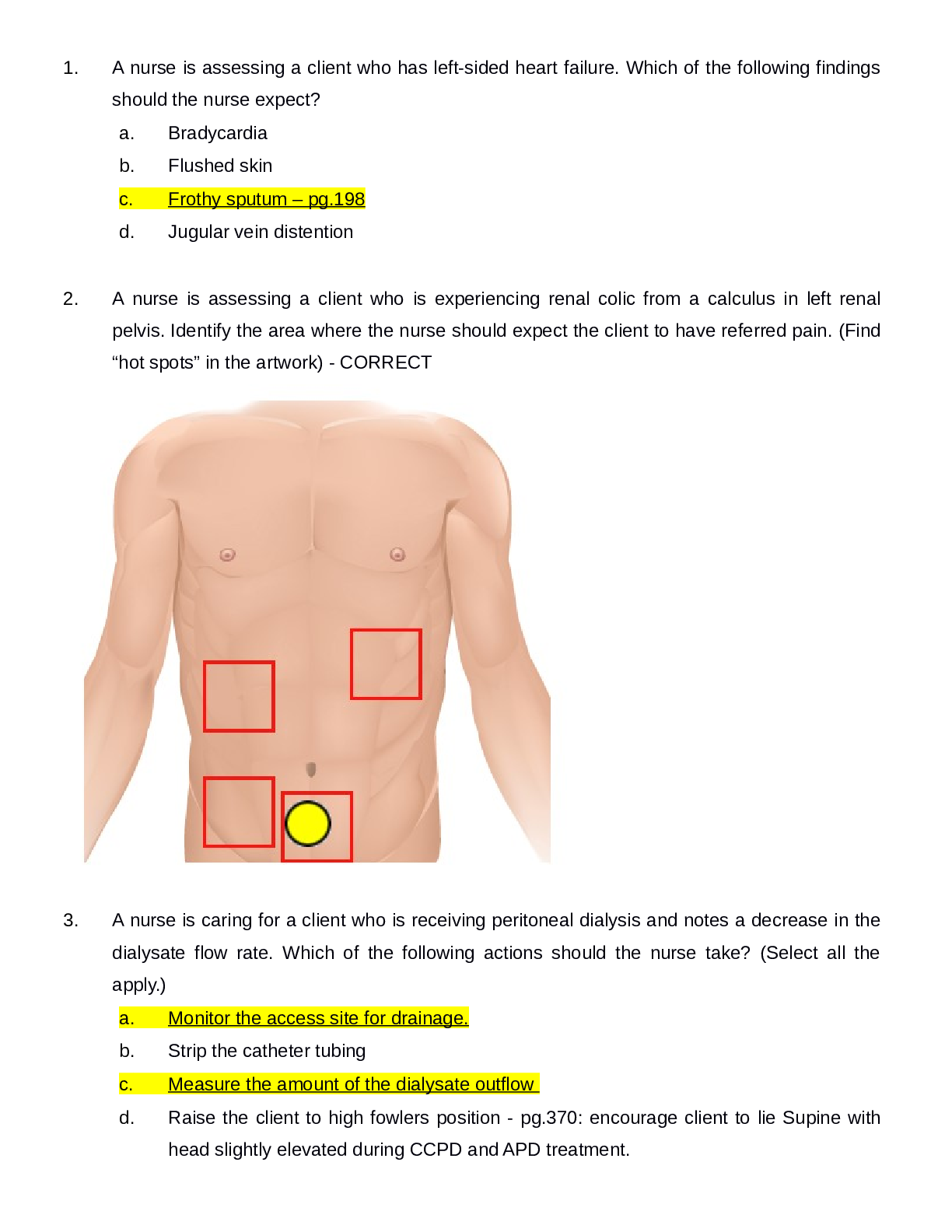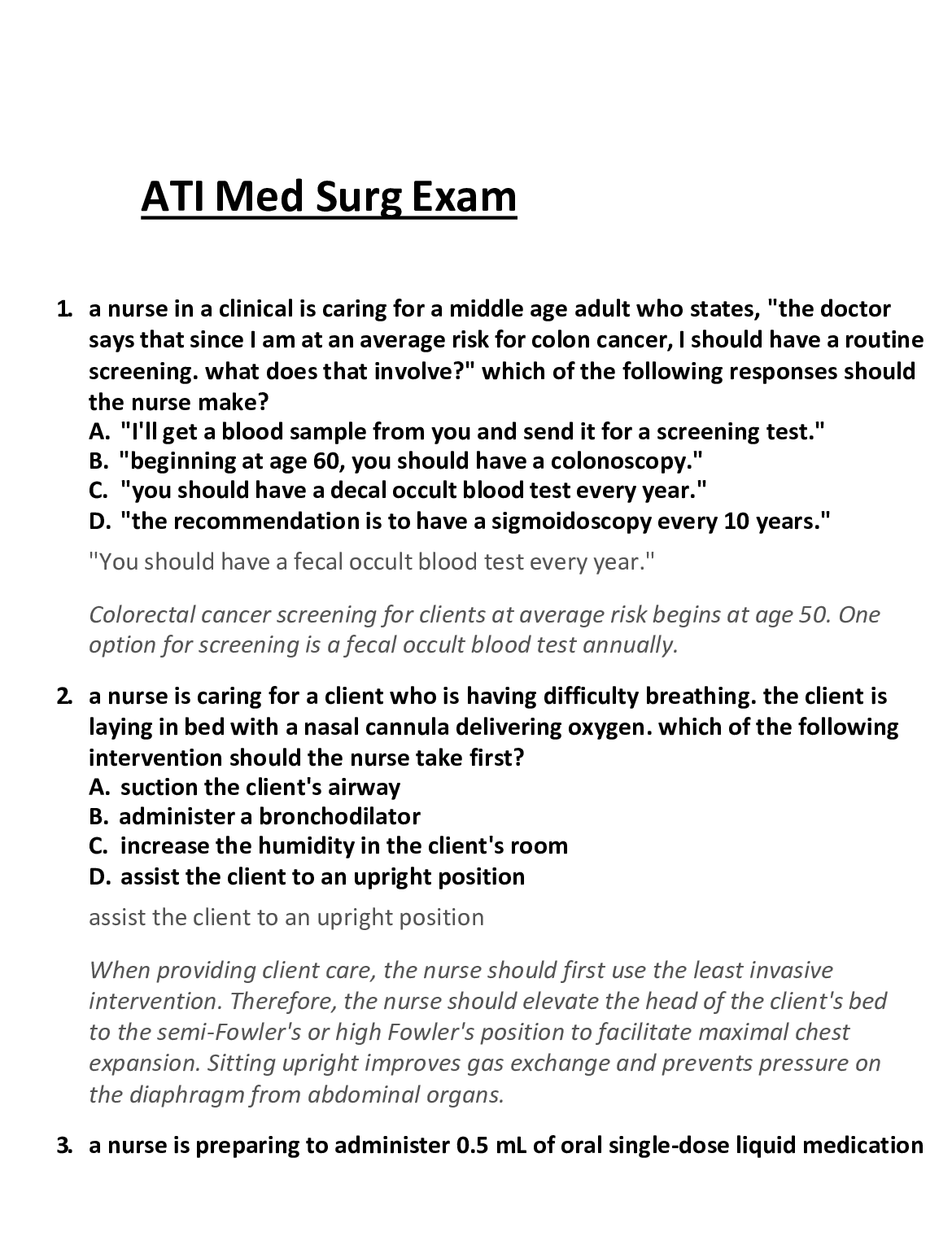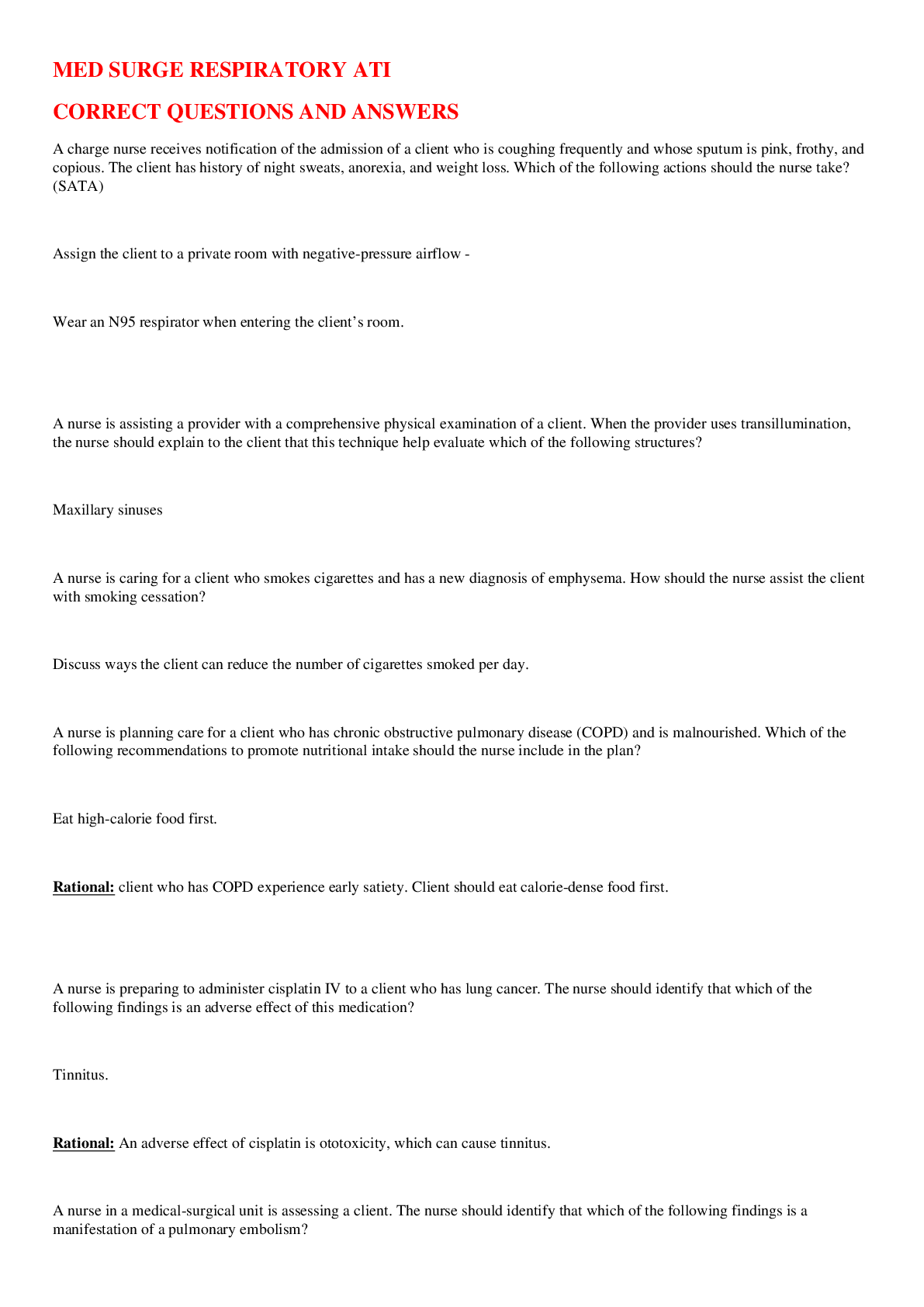Health Care > ATI MEDICAL SURGICAL > ATI - MED SURG EXAM 2 - California State University, Long Beach TTT 67777 (All)
ATI - MED SURG EXAM 2 - California State University, Long Beach TTT 67777
Document Content and Description Below
ATI - MED SURG EXAM 2 TTT 67777 1. The nurse is preparing the discontinue long term TPN therapy for a client. The nurse should plan to discontinue the TPN gradually to reduce the risk of which of... the following adverse effects? a. Hyperglycemia b. Diarrhea c. Constipation d. Hypoglycemia- You taper it off to avoid this!!! Rationale PDF p.298: Never abruptly stop TPN. Speeding up/slowing down the rate is contraindicated. An abrupt rate change can alter blood glucose levels significantly. Rationale PDF nutrition p.58: don’t discontinue abruptly, must taper to prevent rebound hypoglycemia 2. A nurse is preparing a client for an ECG. The client is anxious and says that he is afraid the equipment will give him an electric shock. Which of the following is an appropriate response by the nurse? a. The machine only senses and records electrical currents coming from your heart – pg.170 Electrocardiography uses an electrocardiograph to record the electrical activity of the heart over time. b. The lead wires and cables are insulated for your safety c. The electrode pads will prevent the conduction of electricity to your skin d. The machine voltage delivery is low enough that you won’t feel any discomfort 3. A nurse is caring for client who has hypertension and has a new prescription for lisinopril. The nurse should consult with the provider about which of the following medications in the client’s medication administration record? a. Potassium chloride b. Levothyroxine c. Acetaminophen d. Metformin 4. A nurse is administering furosemide 80 mg PO twice daily to a client who has pulmonary edema. Which of the following assessment findings indicates to the nurse that the medication is effective? a. Elevation in blood pressure b. Adventitious breath sounds c. Weight loss of 1.8 kg (4 lb) in the past 24 hr d. Respiratory rate of 24/min 5. Couldn't paste the picture on here. But it asked where u can hear pericardial friction rub the best at…Erb’s Point (3rd Intercostal, Central) 6. A nurse is completing discharge teaching with a client who has a new diagnosis of AIDS. Which of the following statements by the nurse indicates an understanding of the teaching? a. I will increase the amount of fresh veggies b. I will wipe up areas soiled with body fluids with alcohol and immediately dispose of the trash c. I will need to take my clothes to the dry cleaners to sterilize them d. I will be sure to wear gloves and wash my hands when I change my cat’s litter box 7. A nurse is performing a venipuncture on an older adult client whose veins are difficult. Which of the following actions should the nurse take? a. Apply cool compresses b. Elevate the client’s extremity using a pillow c. Tap the skin around the insertion site d. Raise the angle of the catheter to 30 degrees above the insertion site 8. A nurse is caring for a client in the ER following a myocardial infarction. which of the following actions should the nurse anticipate if the client develops asystole? a. Administer atropine b. Defibrillate with 200 joules c. Starts a continuous lidocaine infusion d. Begin CPR – first line of medical management is CPR and ACLS. 9. A nurse is caring for a client with severe burn injury. The nurse should recognize which of the following client findings as an indication of hypovolemic shock? a. Potassium 5.2 mEq/L b. Capillary refill 1.5 seconds c. Urine output 45 mL/hr d. PaCO3 37 mmHg 10. A critical care nurse is assessing a client who has a severe head injury. In response to painful stimuli the client does not open her eyes, displays decerebrate posturing, and makes incomprehensible sounds. Which of the following Glasgow coma scale scores should the nurse assign the client? a. 2 b. 5 c. 10 d. 13 11. A nurse is teaching a client who has heart failure about self-management techniques. Which of the following statements by the client indicates an understanding of the teaching? a. I will keep an exercise diary b. I will take ibuprofen for mild pain c. I will expect swelling in my feet and ankle d. I will weigh myself every other day 12. A nurse is providing discharge teaching for a client who has new tracheostomy. Which of the following statements by the client indicates an understanding of the teaching a. I’ll insert the obturator after cleaning my stoma b. I’ll cut a slit in a clean gauze pad to use as a stoma dressing c. I’ll cleanse the cannula with half strength hydrogen peroxide d. I’ll remove the soiled tracheostomy ties prior to cleaning my stoma 13. A nurse is caring for a client who has a sealed radiation implant which of the following actions should the nurse take? a. Limit family member visits to 30 min per day – pg. 583 Limit visitors to 30‑min visits, and have visitors maintain 6 feet distance from the source b. Give the dosimeter badge to the oncoming nurse at the end of the shift c. Apply second pair of gloves before touching the clients implant if it dislodges d. Remove soiled linens from the room after each change 14. A nurse is reviewing the medical record of a client who has pneumonia. Which of the following serum laboratory values should the nurse expect? a. WBC count 15,000/mm b. Hematocrit 35% c. Sodium 130 mg/dl d. BUN 8 mg/dl 15. A nurse is planning care for a client who has a newly implanted arteriovenous graft in the right arm. Which of the following actions should the nurse include in the plan of care? a. Instruct the client to avoid lifting the right arm for 72 hr b. Check blood pressure in the right arm c. Palpate the site for thrill d. Insert a saline lock into a site 10 cm (4in) distal to the graft 16. A nurse in the emergency department is caring for a client who has a gunshot wound to the abdomen. which of the following should the nurse take first? a. Check the color of the client’s skin – Assessment first b. Prepare the client’s clothing c. Remove all the clients clothing d. Administer an opioid analgesic 17. A nurse is assessing a client who has an arteriovenous (AV) fistula in the left forearm. Which of the following findings should the nurse identify as an indication of a complication at the vascular access site? a. Presence of palpable thrill b. 2 + left radial pulse c. Absence of bruit – pg. 367 d. Dilated appearance of the AV site 18. A nurse is caring for a client who is receiving continuous bladder irrigation following a transurethral resection of the prostate. The client reports spasms and the nurse observes decreased urinary output. Which of the following actions should the nurse take? a. Decrease traction on the catheter b. Remove the indwelling urinary catheter c. Flush the catheter manually with 0.9% sodium chloride d. Administer ibuprofen 400 mg for pain relief 19. A nurse is caring for a client who has contusion of the brainstem and reports thirst. The client’s urinary output was 4,000 mL over the past 24 hr. The nurse should anticipate a prescription for which of the following IV medications? a. Desmopressin – pg.500 Desmopressin, which is a synthetic ADH, or aqueous vasopressin administered intranasally, orally, or parenterally. Results in increased water absorption from kidneys and decreased urine output. b. Epinephrine c. Furosemide d. Nitroprusside 20. A nurse is preparing to administer daily medications to a client who is undergoing a procedure at 1000 that requires IV contrast dye. Which of the following routine medications to give at 0800 should the nurse withhold? a. Valproic acid b. Metformin – pg.530 c. Metoprolol d. Fluticasone Stop Metformin for 48 hr before any type of elective radiographic test with iodinated contrast dye and restart 48 hr after (can cause lactic acidosis due to acute kidney injury). 21. A nurse is preparing a client who is to undergo a thoracentesis. The nurse should place the client in which of the following positions? a. On her affected side with her head lowered b. In high-Fowler’s position with her arms at her side c. Prone position with her arms above her head d. Upright on the edge of the bed leaning over the bedside table 22. A nurse is teaching a client about the use of an incentive spirometer. Which of the following instructions should the nurse include in the teaching? a. Position the mouthpiece 2.5 cm (1in) from the mouth b. Hold breaths 3 to 5 seconds before exhaling c. Place hands on the upper abdomen during inhalation d. Exhale slowly through pursed lips 23. A nurse is caring for a client who is 2 days postoperative following abdominal surgery and has a prescription for opioid analgesia. Which of the following actions should the nurse implement to help facilitate the client’s recovery? a. Provide analgesic medication prior to physical activities b. Inform the client to monitor for loose stools while taking opioid analgesia c. Withhold analgesic medication unless the client reports pain d. Administer naloxone if the client’s respiratory rate is greater than 24/min Give analgesic to relieve pain before getting involved in any physical activity 24. A nurse is preparing to assist the provider with thoracentesis for a client who has left pleural effusion. Which of the following interventions is the priority for the nurse? a. Describe the sensation the client will feel during the procedure b. Reinforce the importance of lying still during the procedure c. Administer a sedative medication d. Determine whether the client has an allergy to local anesthetics - Assessment 25. A nurse is reviewing the medical record of a client who has nephrotic syndrome. Which of the following findings should the nurse expect? a. Decreased serum lipid levels b. Proteinuria c. Hypoalbuminemia d. Decreased coagulation Nephrotic syndrome is a kidney disorder characterized by massive proteinuria, hypoalbuminemia, edema, and elevated serum lipids, anorexia, and pallor. 26. A nurse is planning care for a client following a cardiac catheterization. Which of the following actions should the nurse take? a. Limit the client’s fluid intake to 1 L per day b. Keep the client on bed rest for 24 hr c. Change the client’s dressing every 8 hr d. Maintain the client’s affected extremity in extension 27. A nurse is caring for a client who has a traumatic brain injury. The client, who has been quiet and cooperative, becomes agitated and restless. Which of the following assessments should the nurse perform first? a. Urinary output b. Motor responses – pg.75 c. Blood pressure d. Blood glucose 28. 61. A nurse is providing discharge teaching to a client who has systemic lupus erythematosus. Which of the following statements by the client indicates an understanding of the teaching? (Select all that apply) a. I will use NSAIDS to treat aches and pains – pg.561 b. I will use cosmetics without moisturizer c. I will disinfect skin lesions with rubbing alcohol d. I will wear long sleeve when outdoor e. I will increase my intake of sodium CLIENT EDUCATION ●● Avoid UV and prolonged sun exposure. Use sunscreen when outside and exposed to sunlight. ●● Use mild protein shampoo and avoid harsh hair treatments. ●● Use steroid creams for skin rash. ●● Report peripheral and periorbital edema promptly. ●● Report evidence of infection related to immunosuppression. ●● Avoid crowds and individuals who are sick, because illness can precipitate an exacerbation. ●● Educate client of childbearing age regarding risks of pregnancy with lupus and treatment medications 29. A nurse is reviewing the laboratory results of a client who has COPD and severe dyspnea. Which of the following ABG values should the nurse expect? a. PaCO2 50 mmHg b. pH 7.4 c. PaO2 95 mmHg d. HCO3 20 mEq/L 30. A nurse is caring for a client who has atrial fibrillation. Which of the following should the nurse expect to administer? a. Dobutamine b. Lidocaine c. Atropine d. Amiodarone – ACLS Class. Pg. 171 31. A nurse is caring for a client who is receiving epidural analgesia. Which of the following findings is the nurse’s priority? a. Bladder distention b. Weakness to lower extremities c. Hypotension – pg. 626 d. Hypoactive bowel sounds 32. A nurse is planning care for a client who has chest drainage system set to low suction following a thoracotomy. Which of the following nursing actions is appropriate to include in the plan of care? a. Check for bubbling in the water seal chamber – pg.104 b. Empty the collection c. Keep the water seal chamber at chest level d. Loop excess tubing below the chest wall Continuous bubbling in the water seal chamber indicates an air leak in the system 33. A nurse is caring for an older adult client who is prescribed packed RBCs. Which of the following actions is appropriate for the nurse to take? a. Obtain vital signs every hour during transfusion b. Administer the transfusion over a 4-hr period c. Infuse lactated Ringer’s solution while transfusing the blood product d. Use a 24-gauge needle for the transfusion 34. A nurse in the intensive care unit is caring for a client who has the following ABG results: pH 7.30; HCO3 19 mEq/L, PaCO2 with the expected reference range. a. Respiratory alkalosis b. Respiratory acidosis c. Metabolic acidosis d. Metabolic alkalosis 35. 68. A nurse is providing discharge teaching to a client who has an impaired immune system due to chemotherapy. Which of the following information should the nurse include in the teaching? a. Change the pet’s litter box daily b. Change the water in your drinking glass every 4 hours c. Wash your toothbrush in the dishwasher once each month d. Wash your perineal area two times each day with antimicrobial soap – pg.90 36. A nurse in the emergency department is caring for a client who is in hypovolemic shock. Which of the following actions should the nurse take first? a. Administer IV therapy b. Insert a large bore IV catheter c. Monitor urine output d. Obtain a blood specimen for type and crossmatch 37. A nurse is providing a discharge teaching for a client who has heart failure and is to start therapy with digoxin. Which of the following statements by the client indicates an understanding of the teaching? a. “I will notify my provider if I experience muscle weakness.” – pg. 366: sign of toxicity b. “I will take my digoxin if my pulse is less than 50 beats per minute.” c. “I will increase my dose if my vision becomes blurred.” d. “I will take this medication with fiber to constipation.” 38. A nurse is assessing a client following the insertion of a central venous catheter. Which of the following findings indicates a pneumothorax? a. Diminished breath sounds b. Distended neck veins c. Irregular heart rate d. Itching over the incision [Show More]
Last updated: 1 year ago
Preview 1 out of 14 pages
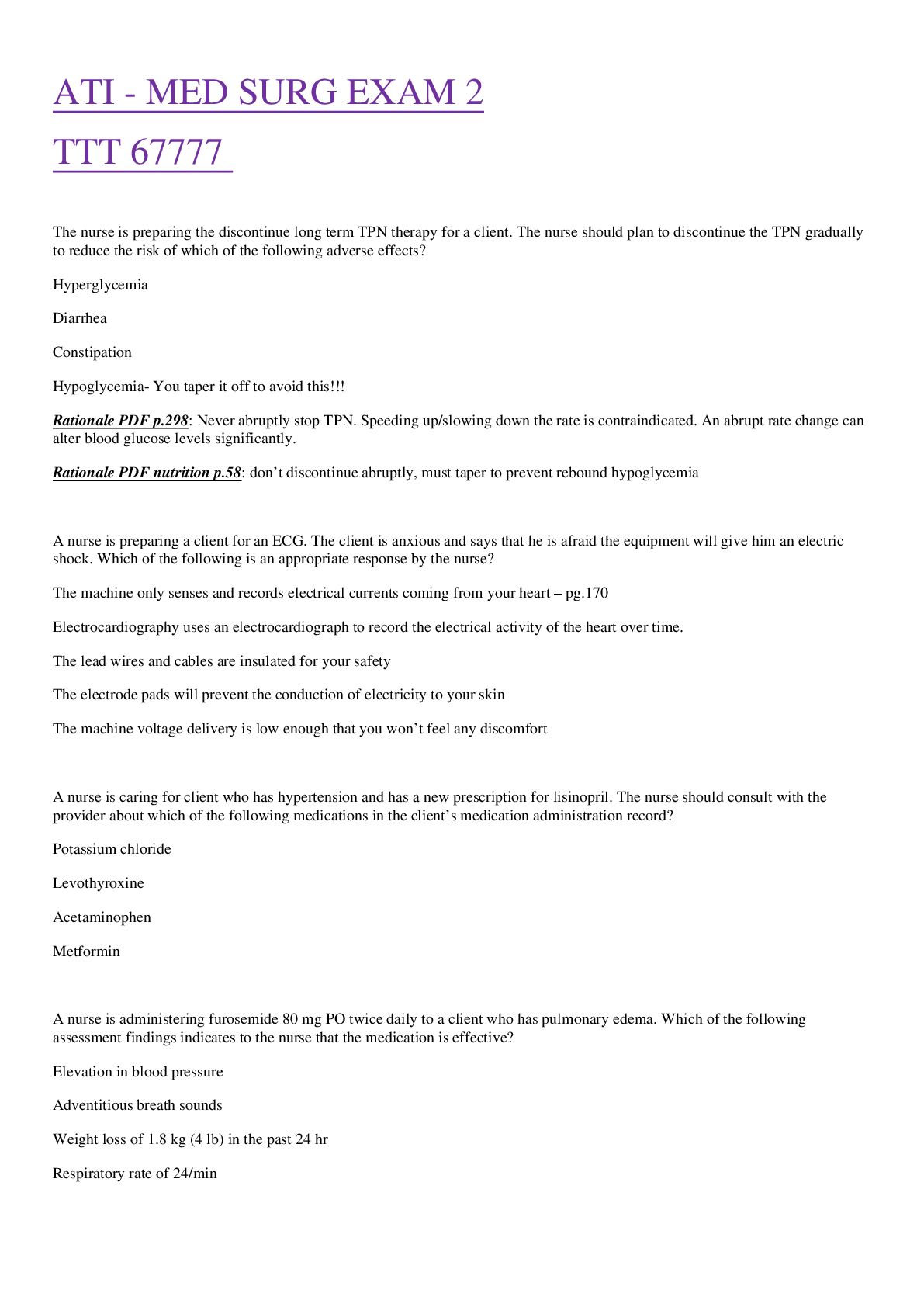
Reviews( 0 )
Document information
Connected school, study & course
About the document
Uploaded On
Apr 10, 2022
Number of pages
14
Written in
Additional information
This document has been written for:
Uploaded
Apr 10, 2022
Downloads
0
Views
80

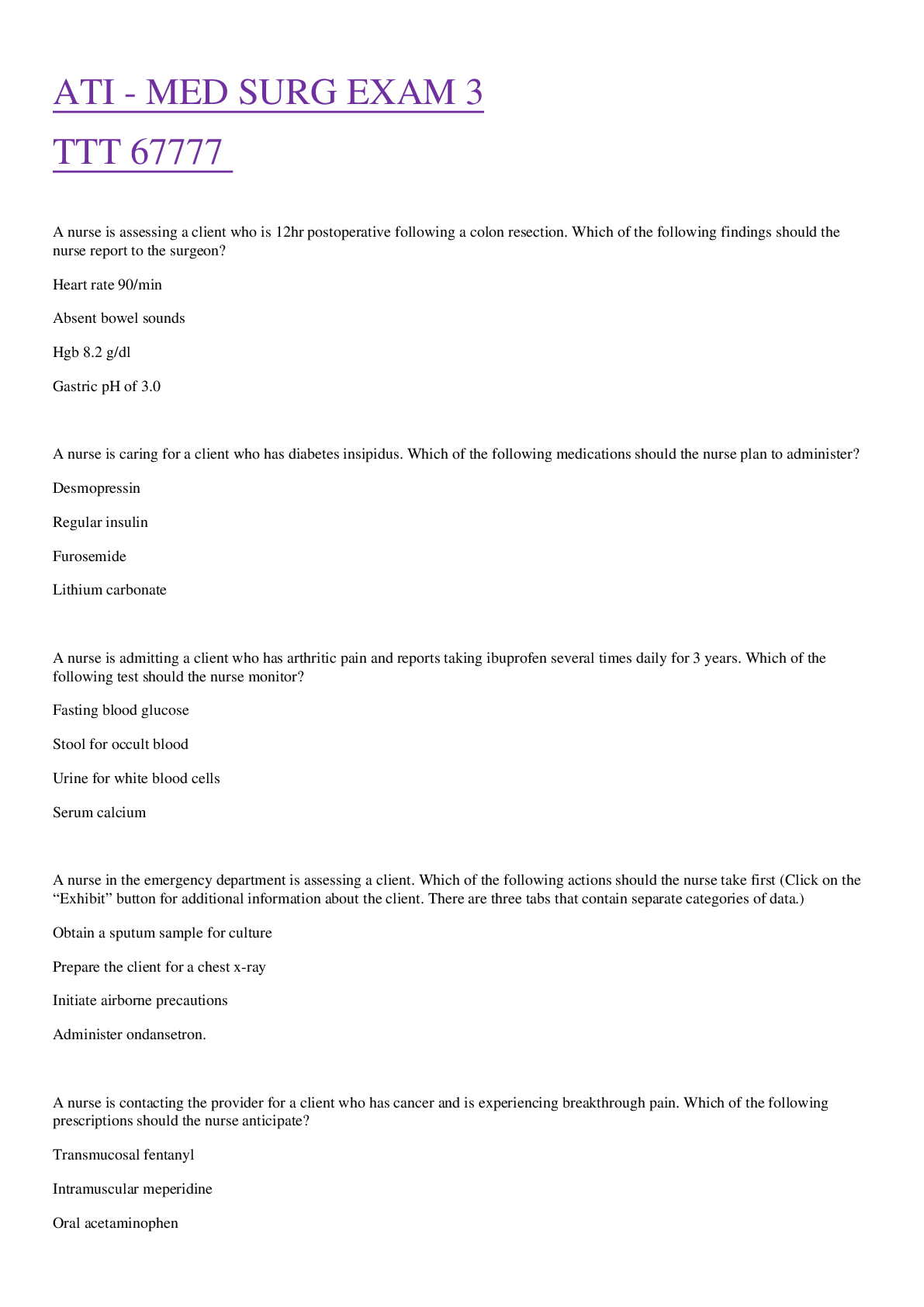
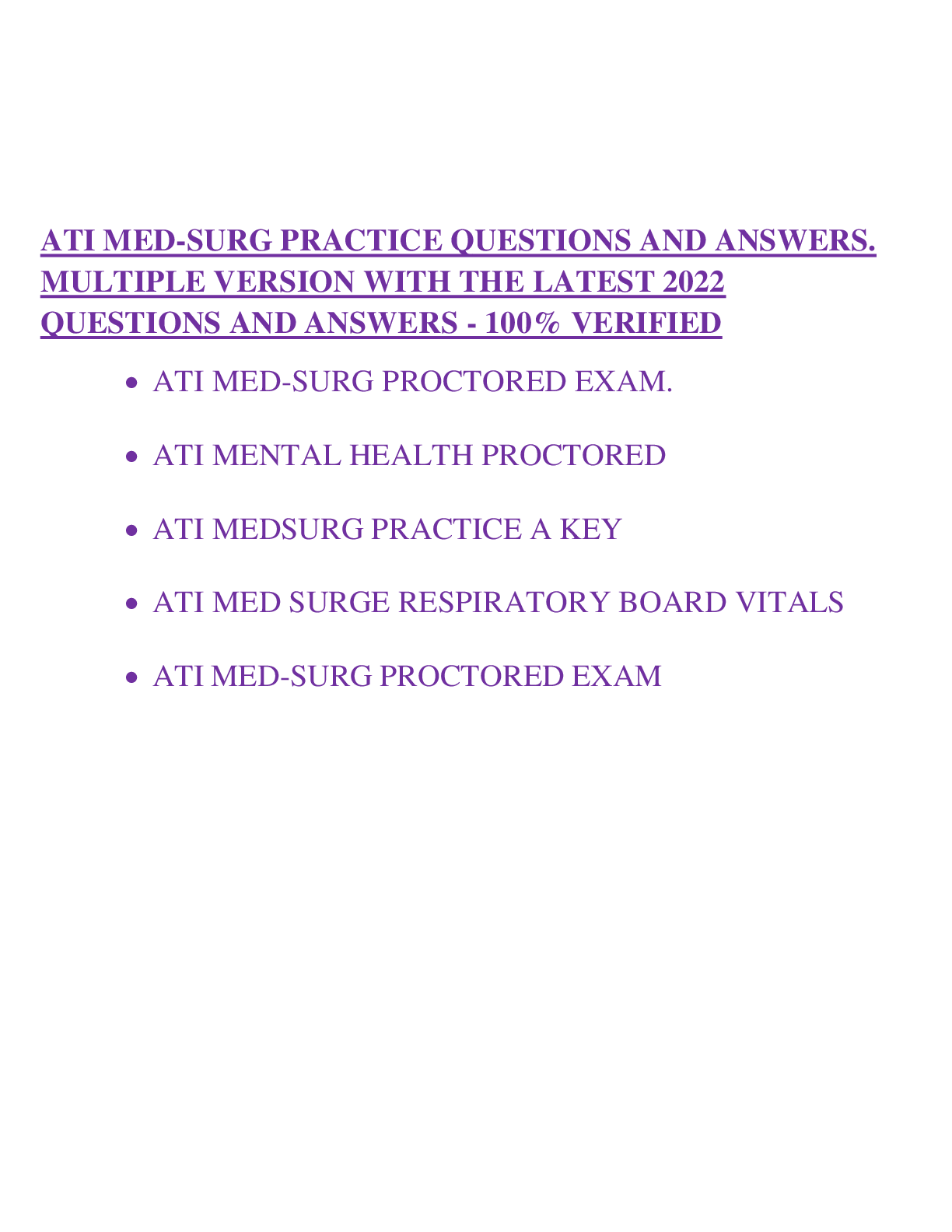
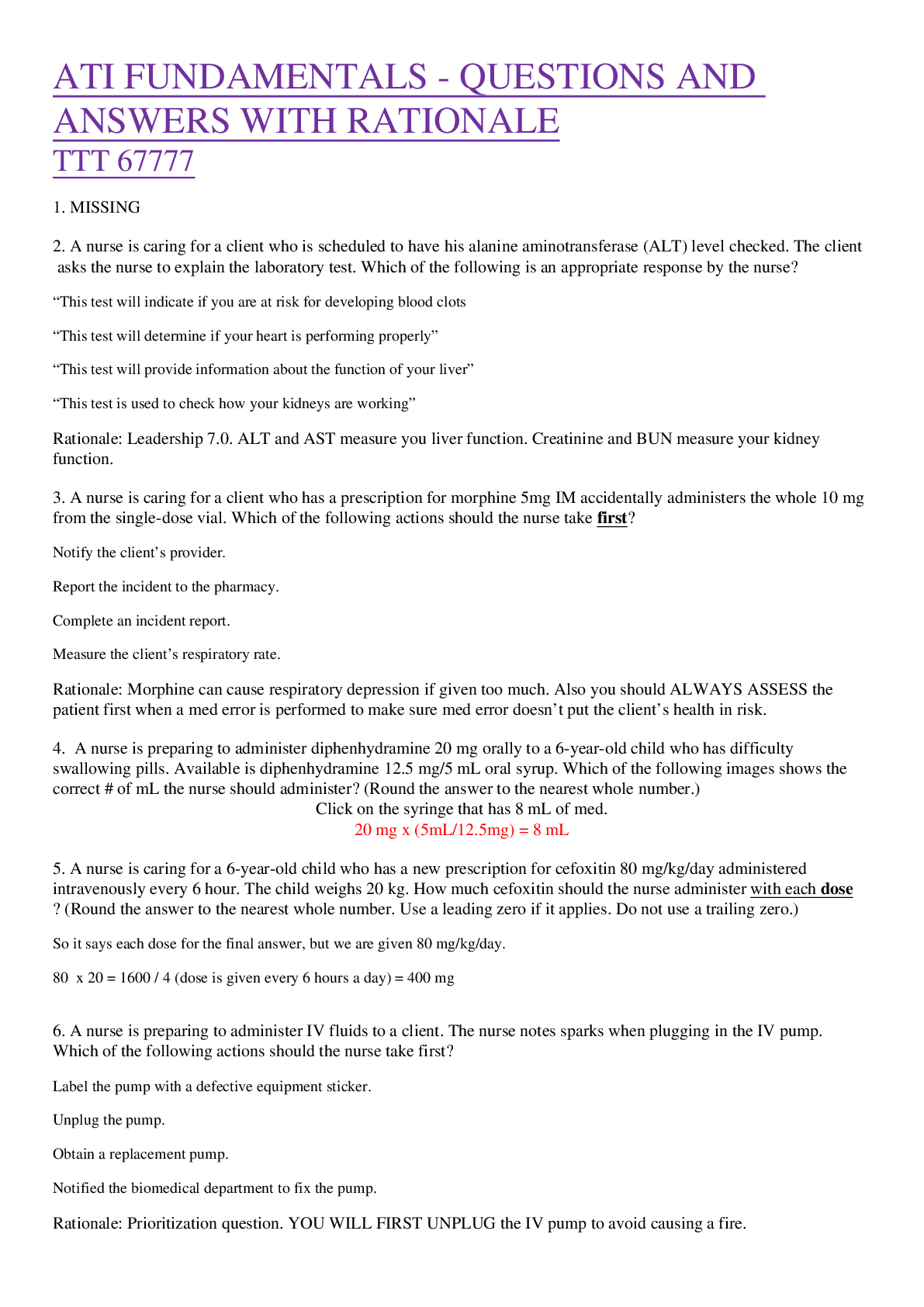
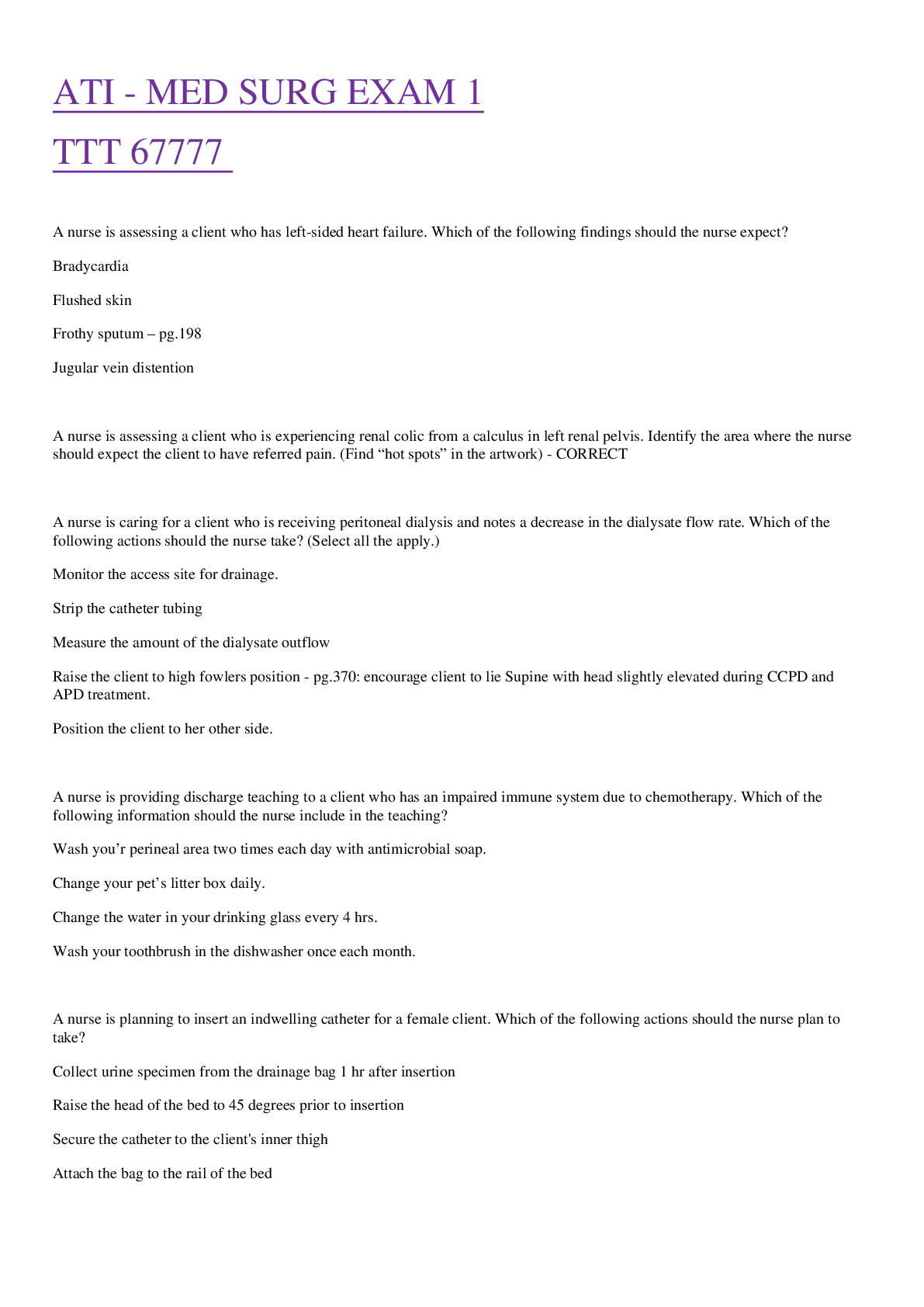
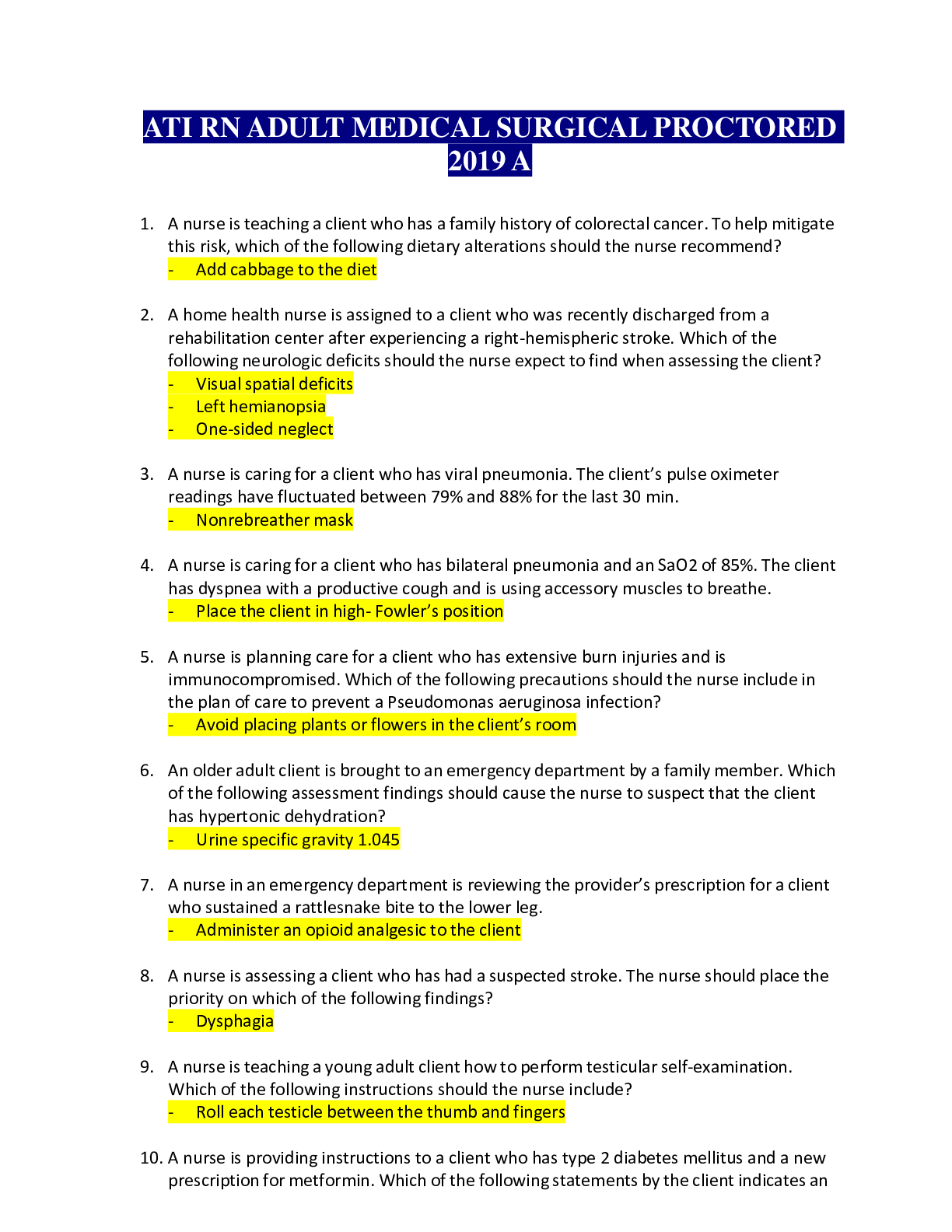
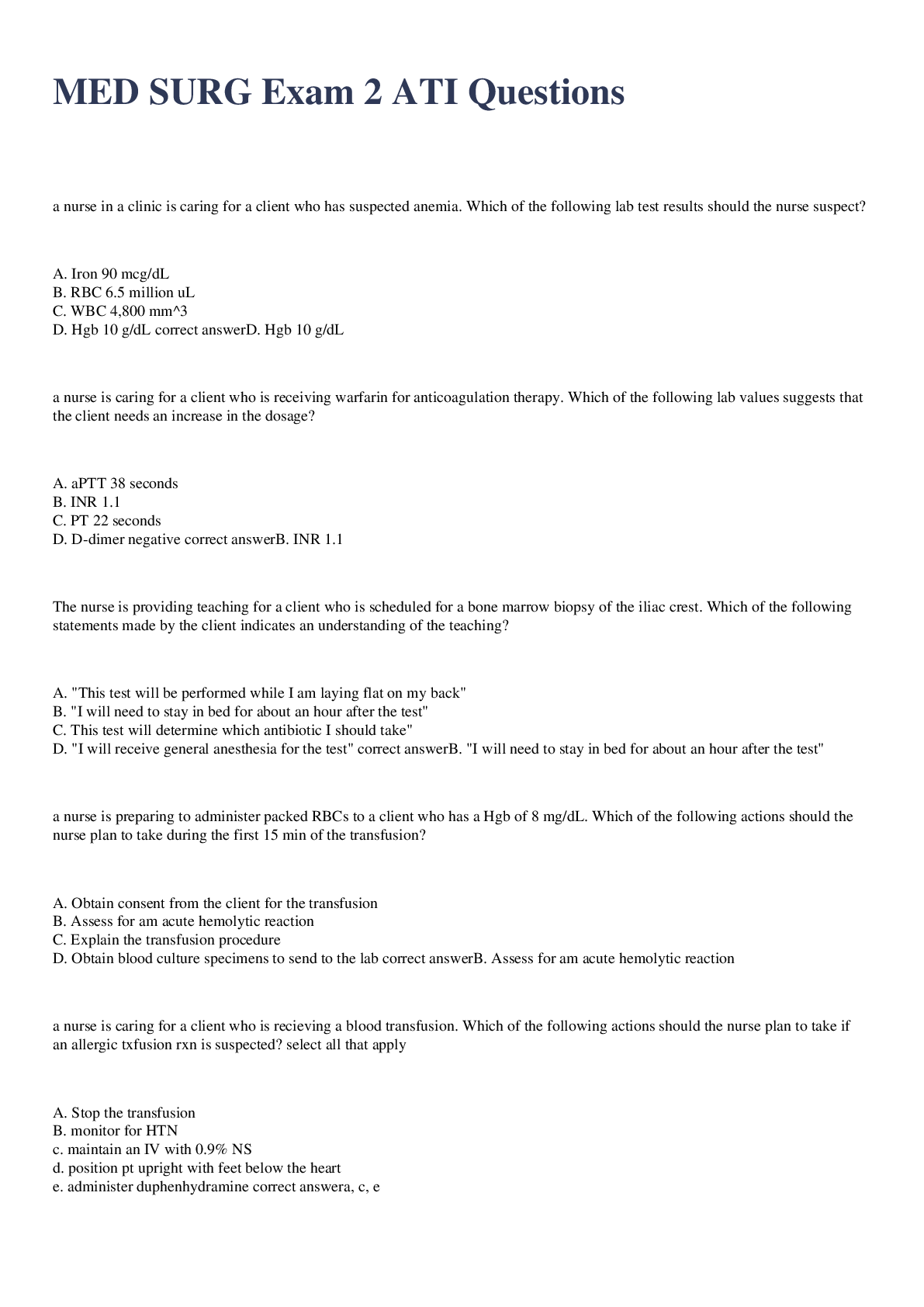
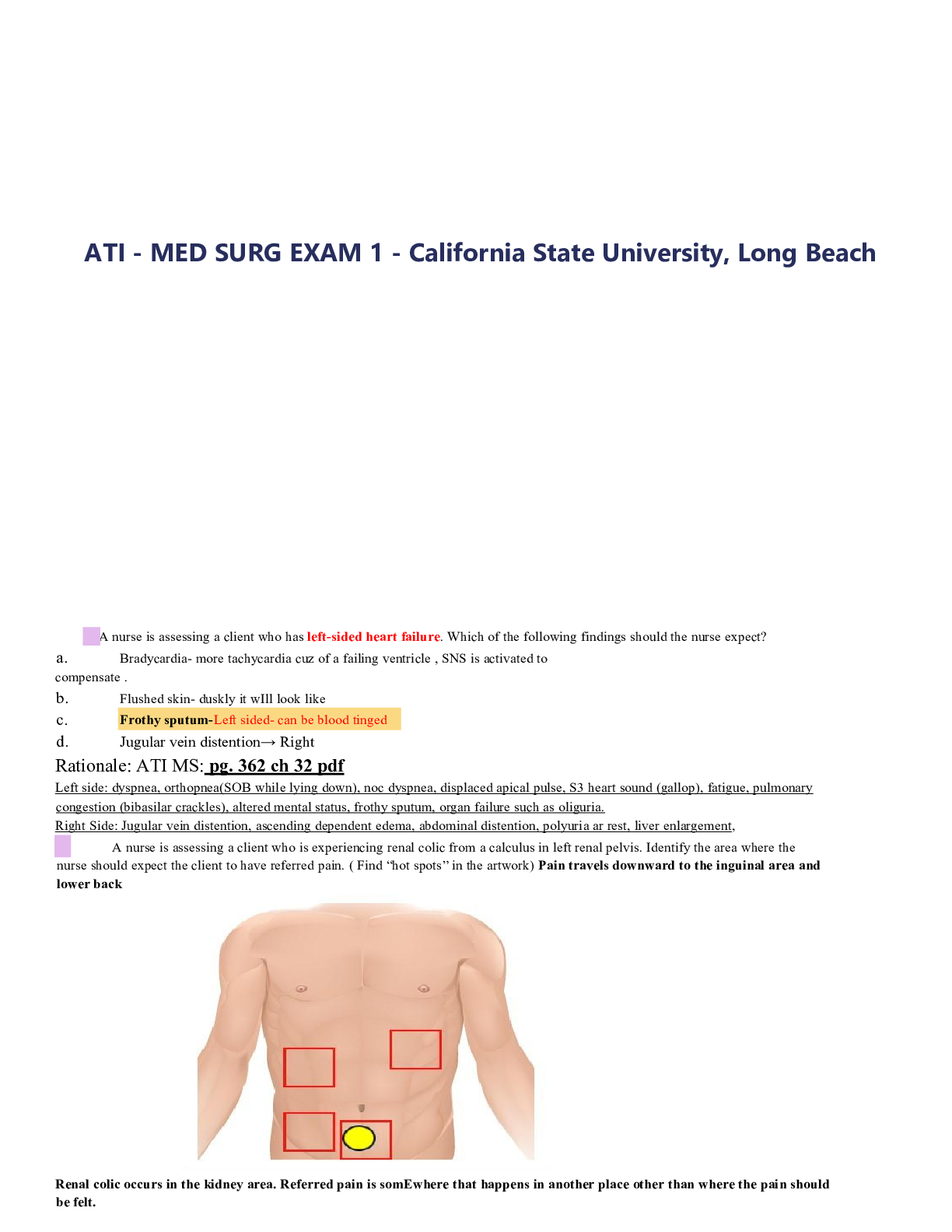
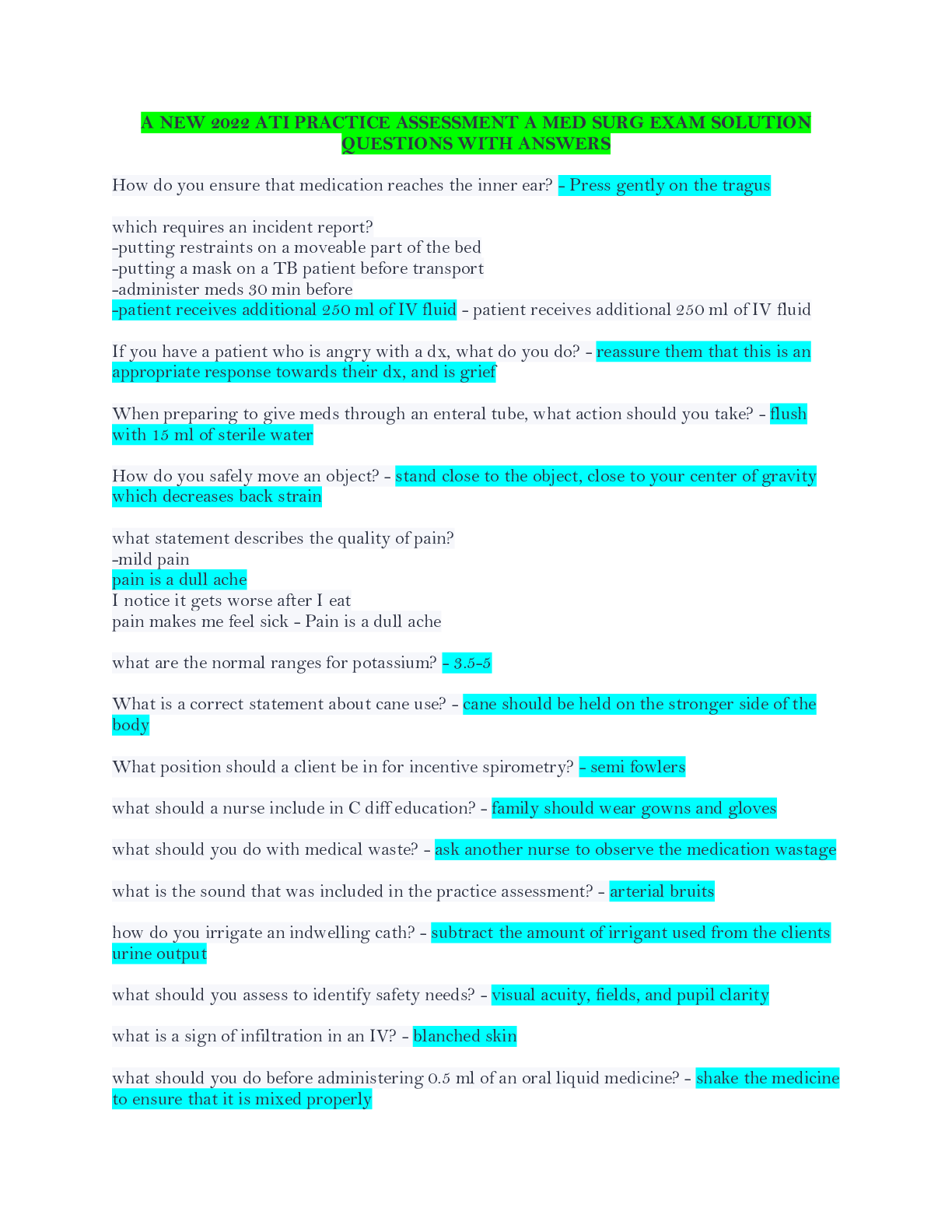

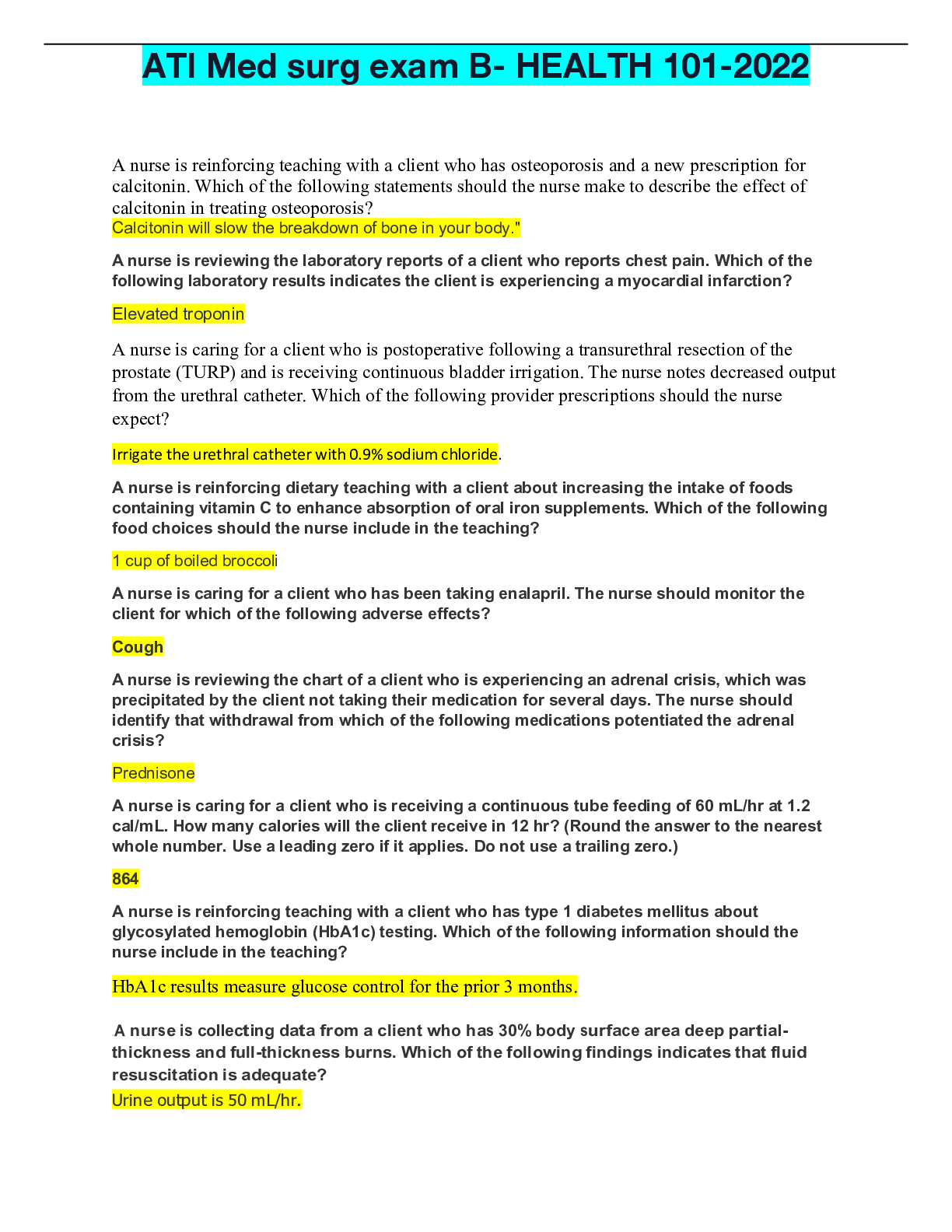
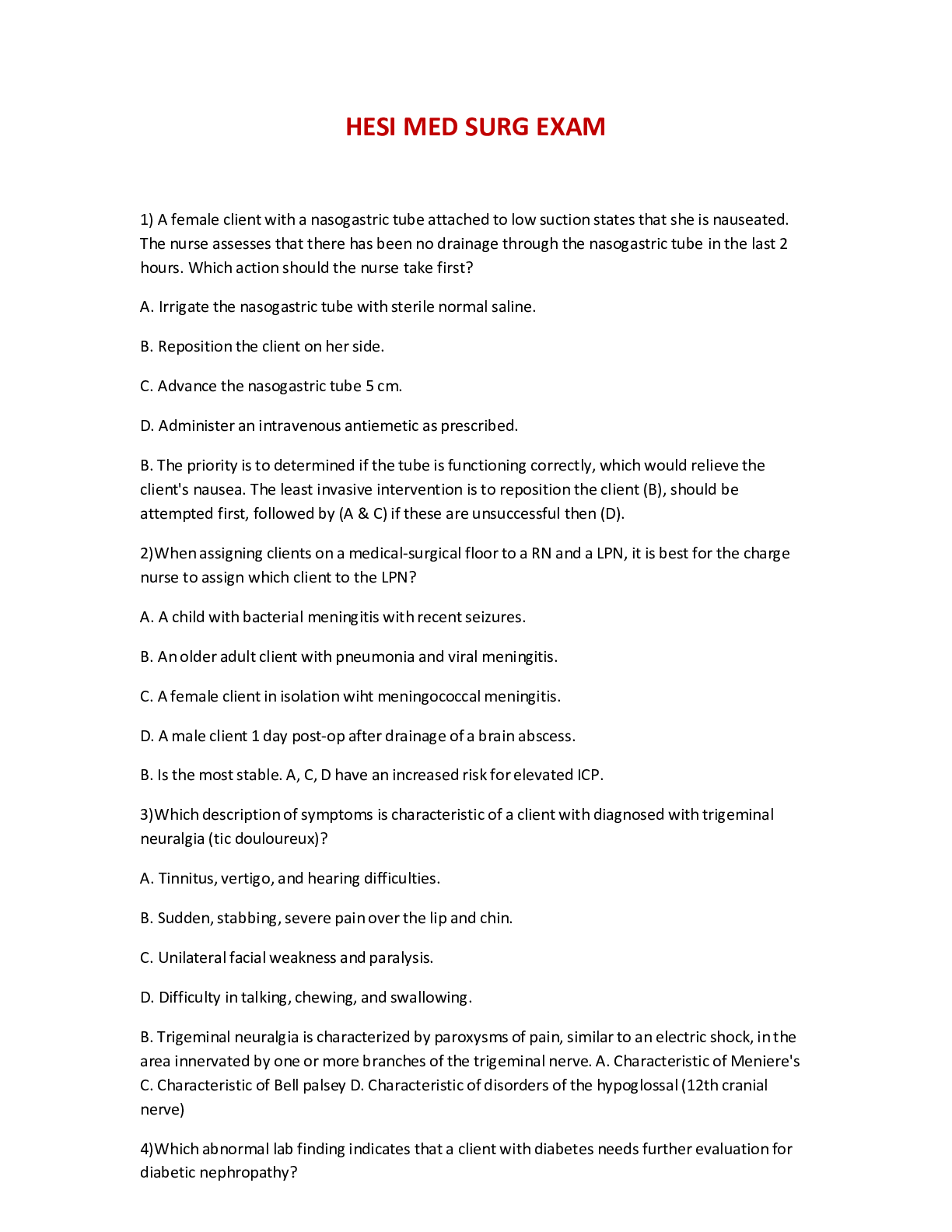
 Updated 2022.png)

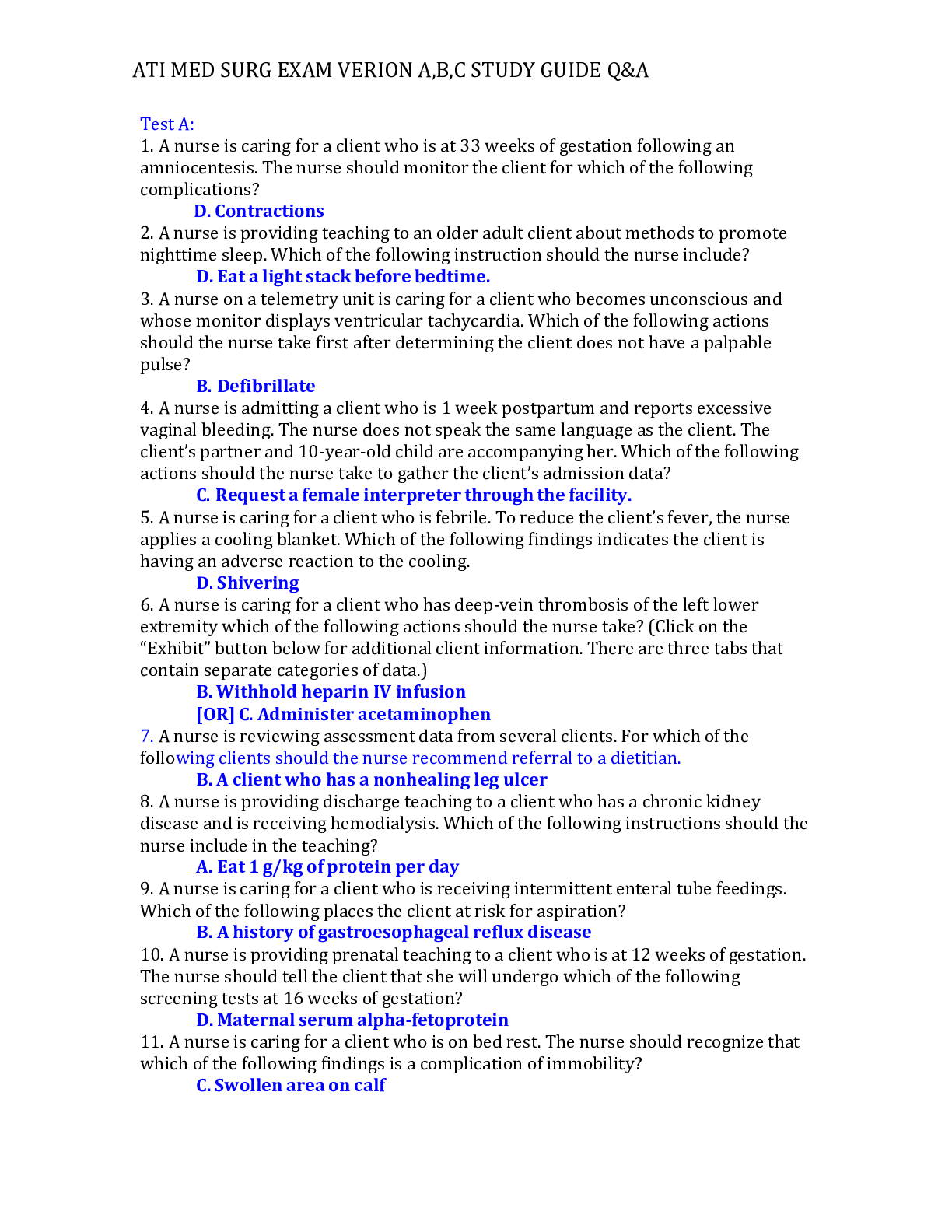
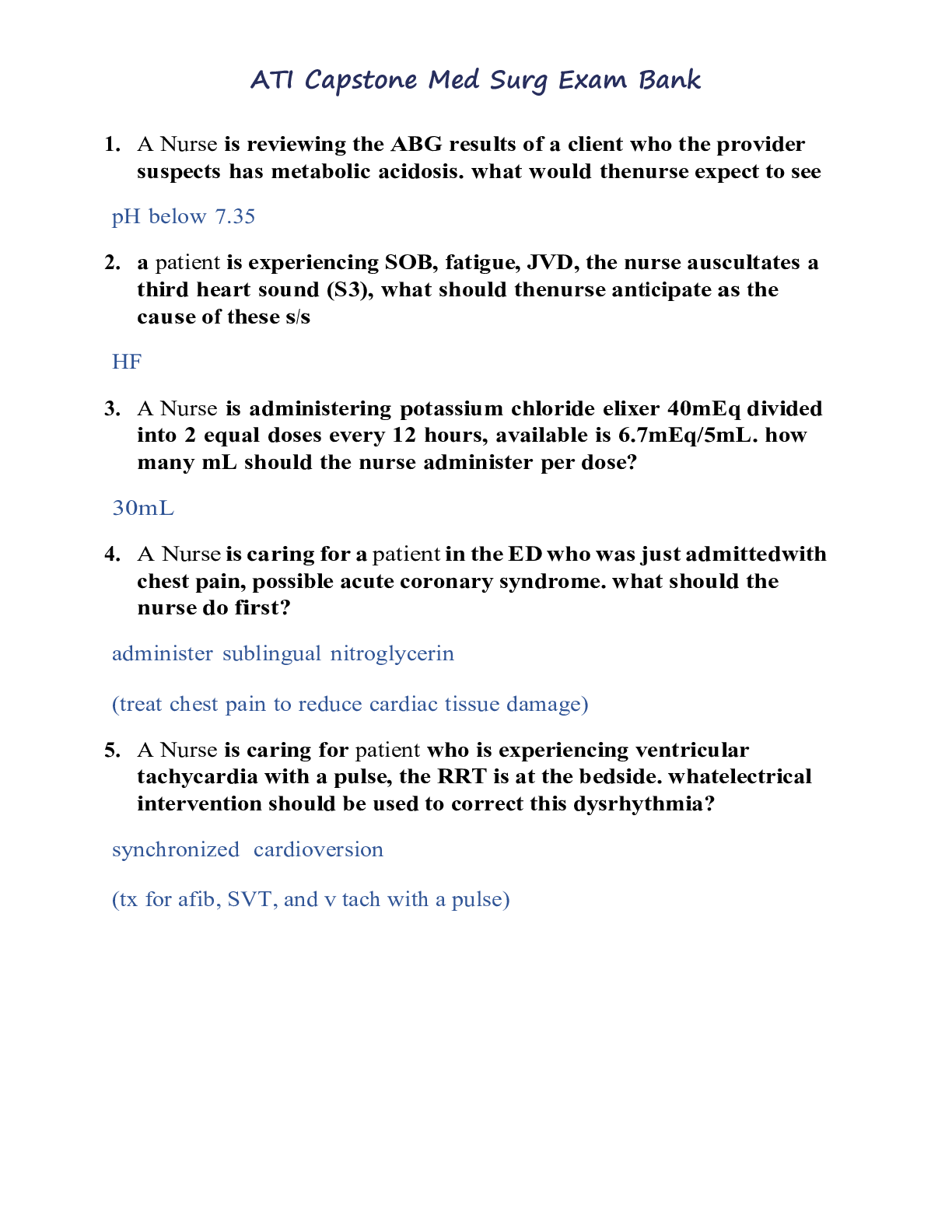
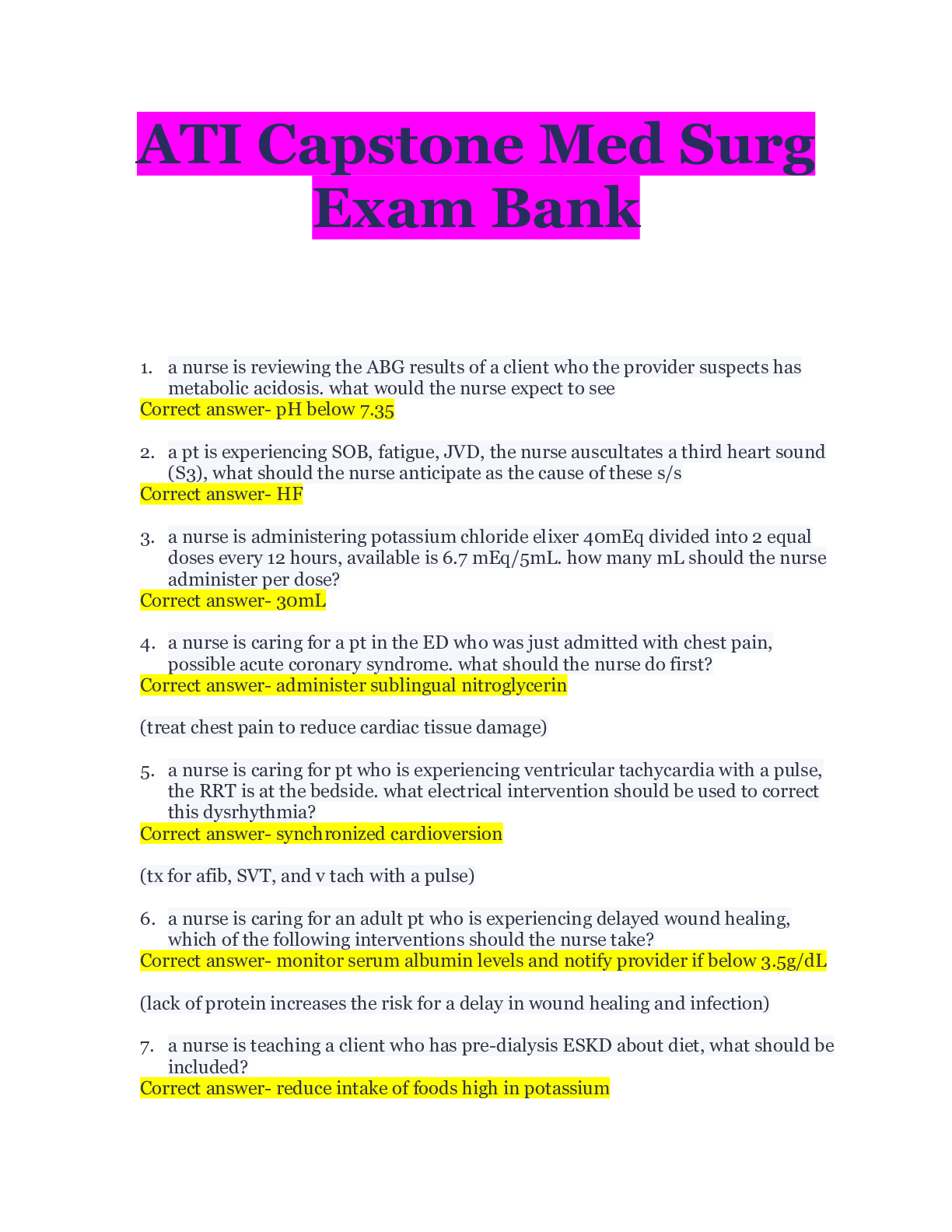
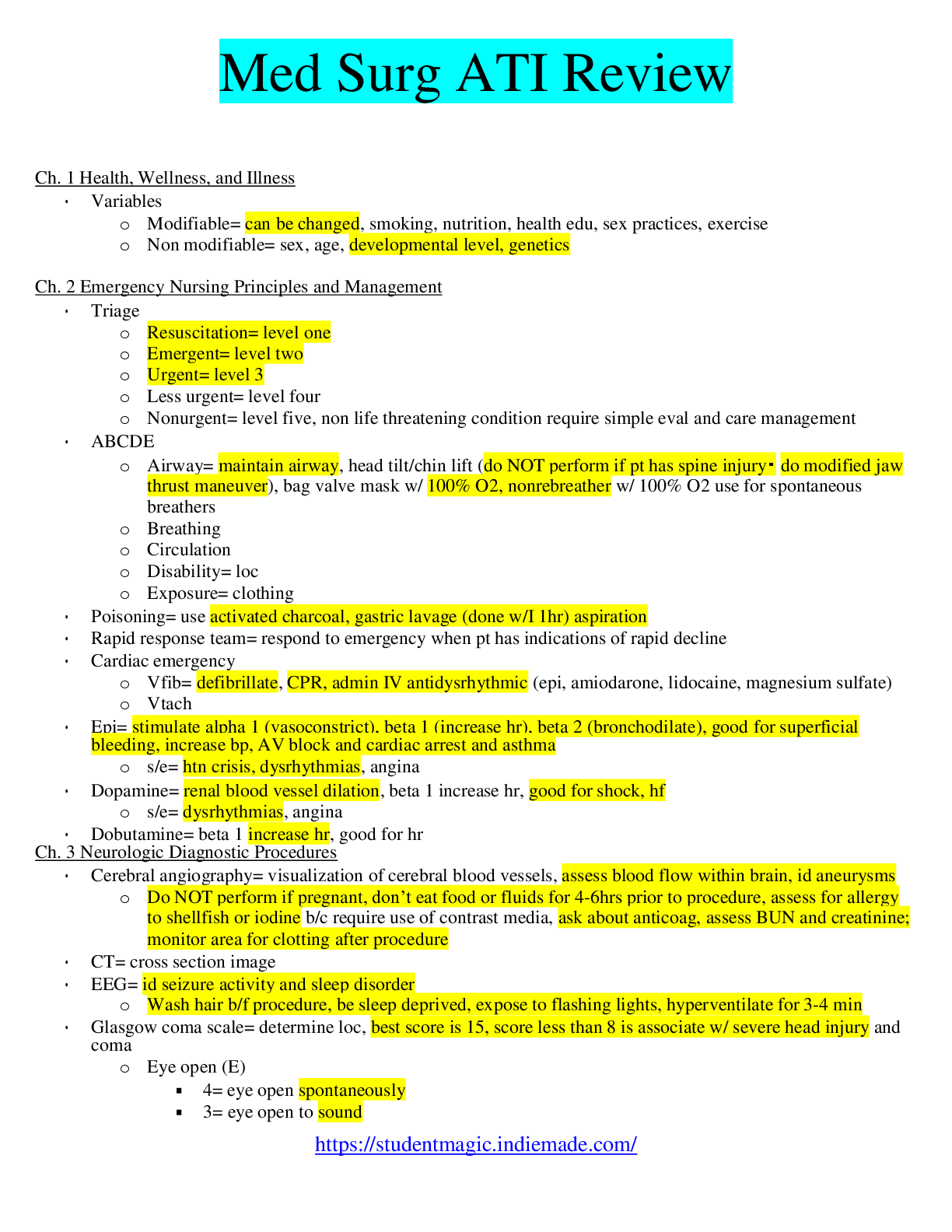

 Revised Exam Guide All Questions Fully Answered.png)
